12 Proven Aloe Vera Benefits (Plus Uses & Precautions)
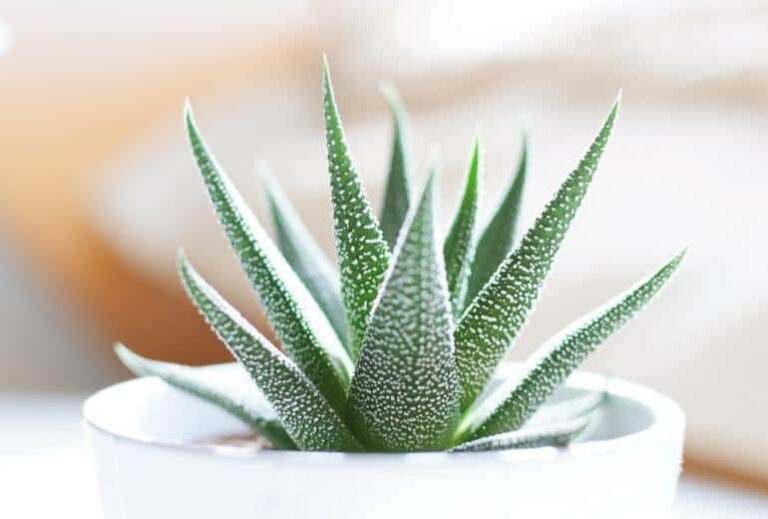
You probably know aloe vera as the plant to turn to for burns, rashes, scrapes, and skin care.
What you may not know about this cactus-like succulent plant is that it is rich in life-giving compounds for internal health as well. Read on to learn how aloe vera’s more than 75 immune-boosting components can benefit your health, and easy ways to use it daily.
In this article:
- The History Behind Aloe Vera Use
- Today's Medicinal Uses for Aloe Vera
- Where to Find Aloe Vera
- Adding Aloe to Your Smoothie
- Aloe Vera Precautions
The History Behind Aloe Vera Use
Aloe vera is one of the oldest medicinal plants in use. From ayurvedic medicine to homeopathy, aloe vera has held a place on apothecaries’ shelves for 6,000 years. In Egypt, it was known as the plant of immortality, and the Greeks thought of aloe as a universal cure for all diseases.¹
Fun fact: The aloe vera plant can survive for more than 7 years without water.
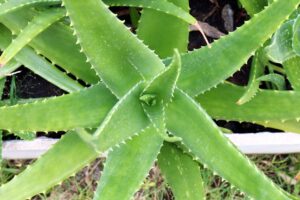
Aloe vera has a long history of being used to heal medical problems.
Today’s Medicinal Uses for Aloe Vera
Aloe vera really didn’t gain widespread use in America until the mid-1900s. And, even then, it was mostly for skin care and not for internal use. Its rise to a superfood has been a long time coming, but we’re much better versed now in aloe vera’s many health benefits, both inside and outside the body.
Aloe Vera’s Top Uses And Scientifically-Proven Health Benefits
1. Stimulates the immune system.
Aloe vera contains a powerful immune-boosting polysaccharide known as acemannan. This compound fights bacteria, viruses, and cancer cells by injecting itself into cell membranes. This action increases the permeability of the membrane, allowing toxins to flow out of the cell and nutrients to enter.
This long-chain sugar also stimulates the synthesis and release of interleukin-1, a compound made by our white blood cells that attacks cancer cells and fights infections.²
[Related: 7 Natural Immune Boosters]
2. Reduces inflammation and soothes arthritis pain.
While aloe vera has been used topically for many years to ease the pain of arthritis, it also reduces inflammation within the body when taken orally.
Inflammation has been linked to virtually all diseases, which include cancer, Alzheimer’s, diabetes, and atherosclerosis, a causative factor in both heart disease and strokes.
Aloe vera contains fatty acids that have anti-inflammatory as well as some analgesic properties, including campesterol, beta-sisosterol, and lupeol.
The plant is also rich in powerful antioxidants that fight inflammation and reduce free radical damage. These antioxidants include vitamins A, C, E, and B12, as well as folic acid and choline. Studies have shown an inverse relationship between dietary antioxidant intake and the development of cardiovascular diseases.³
The International Journal of Inflammation reported that aloe emodin, a compound found in aloe vera, significantly improves both arthritis and inflammation.4
Another remarkable study revealed that aloe vera actually stimulates the production of fibroblasts, which both repair and stimulate growth of the synovial sac, the layer that provides a cushion between bones, tendons, and muscles.5
[Related: How To Reduce Inflammation And Pain Naturally]
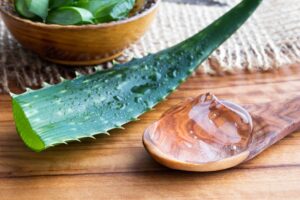
Aloe vera has known benefits when ingested, not just when applied to the skin.
3. Reduces the symptoms of asthma.
Currently, more than 26 million Americans are affected by asthma -- and inflammation, once again, is at the root of this disease.6 During an asthma attack, the air passages known as bronchial tubes become inflamed, narrowing the passageways through which oxygen flows. This constriction results in shortness of breath, coughing, and wheezing.
While past medical treatments focused on reducing the contraction of the bronchial muscles, today’s knowledgeable practitioners focus on reducing the chronic inflammation on an ongoing basis, not just when symptoms arise.
Because of its anti-inflammatory and immune-enhancing properties, studies show that aloe vera reduces the inflammation and mucous associated with asthma.7
4. Reduces cholesterol and high blood pressure.
High cholesterol and high blood pressure are two of the most common risk factors associated with heart disease and strokes. The compounds in aloe vera have been shown to reduce both of these silent but deadly conditions.
This response is due in part to aloe’s high levels of vitamin C, which increases circulation and strengthens the arteries and veins. Polymers found within the plant’s stalks help improve blood flow, increasing the cell’s oxygen supply and circulation.
Marina Kameneva, a bioengineer at the University of Pittsburgh’s McGowan Institute for Regenerative Medicine, published several studies after discovering these polymers that she believes will eventually be used to treat heart attacks, stroke, and other circulation problems.8
A study published in the Journal of Nutritional Science and Vitaminology showed that the liver produced 30 percent less cholesterol when subjects received aloe vera in their drinking water. The researchers concluded that “life-long dietary aloe supplementation suppresses free radical-induced oxidative damage and age-related increases in hepatic cholesterol.”9
5. Relieves constipation.
The anthraquinones in aloe vera act as laxatives. They stimulate the colon, increase water and ease bowel movements.10
Of course, if your diet is predominantly plant-based whole foods, you will not likely have the need for a laxative! But if you’ve indulged in animal products and processed foods, your body may need some help regaining its balance.
The quickest way to use aloe vera as a laxative is to put it into your smoothie. Use a small piece (half an inch or so) of the plant that includes the outside of the leaf, not just the gel inside.
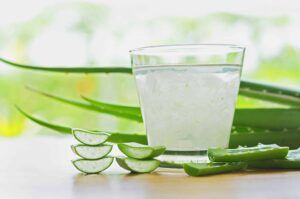
Small pieces of aloe vera added to a smoothie can make a world of difference.
6. Stabilizes blood sugar.
Due to processed diets and inactive lifestyles, diabetes has become a global epidemic. It affects 371 million people, over half of whom are unaware that they have the disease.11
Clinical studies of diabetic patients have demonstrated that aloe vera stimulates the production of insulin while reducing blood sugar levels and cholesterol when taken orally.3, 12
7. Relieves the symptoms and can help heal digestive disorders like heartburn, ulcers, IBS, Crohn’s disease, and esophageal reflux.
The same compounds in aloe vera that mitigate constipation, known as anthraquinones, also support healing and protection of the intestinal wall.
Because of its gel-like nature, aloe vera coats and protects the tissues of the esophagus and stomach and prevents prolonged exposure of stomach acids to the delicate tissues of the esophagus; this exposure is the cause of that burning sensation erroneously called “heartburn.”
Aloe also promotes the growth of healthy intestinal bacteria, while inhibiting the overgrowth of Candida albicans (yeast).
When researchers in the U.K. gave participants with active ulcerative colitis a drink consisting of water and aloe vera gel twice a day for four weeks, their symptoms improved.13
A controlled trial gave participants who suffered from gastroesophageal reflux (also known as GERD) aloe vera twice a day for 4 weeks and found that the aloe reduced the frequency of all the associated symptoms, including heartburn, food regurgitation, flatulence, belching, dysphagia, nausea, vomiting, and acid regurgitation.14
8. Provides one of the best plant sources of vitamin B12.
Vegetarians and vegans can find it's difficult for a plant-based diet to supply enough vitamin B12, an important nutrient that helps keep our nerves and blood cells healthy, in addition to playing a part in the creation of our DNA. Aloe vera is one of the only plant-based sources of this important vitamin.
9. Eases the symptoms of psoriasis.
Psoriasis is an autoimmune condition that causes skin cells to build up on the surface of the skin. These cells become thick, scaly patches that can cause intense itching and a burning pain. Many topical and oral medications produce little comfort for those experiencing this disease.

In some cases, aloe vera can be more effective at treating psoriasis than prescription medication.
The polysaccharides in aloe help the healing gel to penetrate the skin four times faster than water, and to accelerate healing. With its other anti-inflammatory and analgesic properties, aloe becomes a strong contender when looking to heal not just psoriasis, but many inflammatory skin conditions.
A systemic review looked at all dermatology-oriented trials on aloe vera preparations and concluded that topical application can be effective for psoriasis as well as genital herpes, wound healing, burns, and inflammation. Even when taken internally, it was shown to effectively heal wounds.15
The glucomannan encourages collagen production, which helps to reduce the scaly patches associated with psoriasis.
A study conducted in 2012 showed aloe vera to be effective over 80% of the time in the treatment of psoriasis.16
10. Heals wounds and sunburns.
While nothing feels much better than applying cool aloe vera gel to a sunburn, its effects are more than temporary relief.
Applying aloe vera topically to wounds and sunburns speeds up your skin's recovery process. This quick healing is due, in part, to the polysaccharides acemannan and glucomannan, which encourage new cell growth and tissue regeneration. The two hormones found within its stems, auxins and gibberellins, also help heal wounds and reduce inflammation.
When aloe vera was applied to injuries sustained by patients who had undergone skin grafts, they experienced accelerated healing compared to those who did not receive aloe’s healing properties.17
11. Relieves the symptoms associated with genital herpes.
Genital herpes is a disease that can lead to painful blisters. Those who suffer from the sporadic flare-ups of this disease often turn to topical drugs to reduce the discomfort associated with this virus.
Fortunately, aloe offers a natural alternative. Its anti-inflammatory, anti-microbial and immune-stimulating properties offer relief and have been shown to heal the blisters associated with herpes.
In a controlled trial, 60 patients experiencing their first episode of genital herpes were treated topically with aloe vera extract or a placebo. Those who received aloe showed significant shorter healing times (5 days compared to 12 days for those that received a placebo). In addition, most did not experience a recurrence of genital herpes 15 months after ending their treatment.
12. Strengthens hair and heals the scalp.
Aloe vera offers multiple benefits for hair. As a rich source of vitamins E, C, and A, it strengthens strands and promotes shiny hair. In addition, it significantly reduces the symptoms of seborrheic dermatitis, what we commonly refer to as dandruff.
This common condition causes an itchy scalp, red patches, and flaky skin. Aloe’s anti-inflammatory and anti-fungal properties soothe a distressed scalp and provide moisture to dry skin.
A study reported in the Journal of Dermatological Treatment found that those patients with seborrheic dermatitis who were treated with aloe vera showed a significant improvement over those that received a placebo treatment.18
Topically, applying a mixture of equal parts aloe vera gel and extra-virgin coconut oil to hair and scalp provides a deep-conditioning treatment that yields remarkable results.

Scalp irritation can be a thing of the past with aloe vera treatment.
Where to Find Aloe Vera
As with most plants, I believe consuming aloe in its raw state is ideal. If it’s not raw, it’s processed, which means it has lost some of its nutritional benefits.
To that end, having your own aloe vera plant to harvest from at home will give you fresh, raw, organic aloe anytime you need it. As a member of the cactus family, it grows wild in desert climates, and it’s very easy to grow indoors, as well -- you just need a sunny windowsill. I have a 25-year-old plant in my house that has survived several moves and lots of harvesting.
If you cannot grow your own, a jug of quality, raw, hand-filleted organic aloe vera gel or juice still offers a remarkable supply of nutrients and can easily be added to your morning green smoothie.
Adding Aloe to your Smoothie
If you have access to the whole plant, simply cut off a spear and toss it into your green smoothie. Because of its bowel-stimulating effects, you will want to start with a small amount and increase as your body adjusts.
If you are adding the gel to your daily smoothie, be sure that it is 100 percent pure, raw, aloe vera gel, without any water or other additives. Look for a gel that has been hand-filleted to remove the outer skin that can be a laxative. My favorite organic aloe gel is shipped to my door, frozen.
Aloe Vera Precautions
In addition to adding aloe to your diet, it’s important that you take further steps to reduce environmental and dietary toxins in your life. If you’re eating a pro-inflammatory diet that includes red meat, sugar, white flour, milk and fried foods, using aloe vera won’t be enough, though it may very well slow down the progression of the imbalances and diseases that are taking root.
Adding aloe vera to your diet can help ease constipation and other discomfort you may be feeling while you transition to a healthier lifestyle that includes a plant-based, whole-foods diet and exercise that will, ultimately, eliminate inflammation for good!
Start slowly, with just a small amount of the gel at first, since it is the outer peel of the plant with the compounds that can move your bowels too quickly if you haven’t built up to using it yet. When you do add a piece of plant with the peel, make sure to start with half an inch or less of the whole spear.
Until further studies have found aloe vera to be a safe dietary addition for pregnant women, we recommend pregnant women avoid it.
Top Aloe Vera Benefits Take-Aways
- Aloe vera has been used for 6,000 years to treat disease and reestablish balance.
- There are over 75 active compounds in aloe vera. These include 20 amino acids, 8 enzymes, 9 minerals, vitamins A, B complex, C, and E, plant sterols, monosaccharides, polysaccharides, antioxidants, and glycoproteins.
- These compounds have anticancer, antiviral, antibacterial and anti-inflammatory properties. Just a few of the many health benefits include supporting your immune system, healing digestive and intestinal imbalances, balancing blood sugar levels, and healing skin disorders.
- Adding aloe vera to your daily green smoothie is a great way to obtain the many nutrients this superfood provides!
Read next: Mums' Magical Antiviral LemonAid Tonic

Disclosure: This post may contain affiliate links that help support the GSG mission without costing you extra. I recommend only companies and products that I use myself.
Sources
1. Manvitha, Karkala et al. Aloe Vera: a wonder plant, its history, cultivation and medicinal uses. Journal of Pharmacognosy and Phytochemistry. 02/2014. https://www.phytojournal.com/vol2Issue5/Issue_jan_2014/19.1.pdf
2. Surjushe, Amar et al. Aloe Vera: A Short Review. Indian Journal of Dermatology. 04/2008. https://www.ncbi.nlm.nih.gov/pmc/articles/PMC2763764/
3. Jones, Ken. Aloe Vera In The Management of Oxidative Stress. Semantics Scholar. https://pdfs.semanticscholar.org/5350/0f776860e66cdd693278ee74890374a9e20b.pdf
4. Kshirsagar, AD et al. Anti-inflammatory and antiarthritic activity of anthraquinone derivatives in rodents. International Journal of Inflammation. 12/2014. https://www.ncbi.nlm.nih.gov/pubmed/25610704
5. Davis, RH et al. Aloe vera and the inflamed synovial pouch model. Journal of the American Podiatric Medical Association. 03/1992. https://www.ncbi.nlm.nih.gov/pubmed/1578350
6. Asthma Facts and Figures. Asthma and Allergy Foundation of America. https://www.aafa.org/asthma-facts/
7. Koul A et al. Aloe vera affects changes induced in pulmonary tissue of mice caused by cigarette smoke inhalation. Environmental Toxicology. 09/2015. https://www.ncbi.nlm.nih.gov/pubmed/24615921
8. Spice, Byron. Aloe vera plant’s polymers are found to improve blood flow. Pittsburgh Post-Gazette. 08/2004. https://www.post-gazette.com/news/science/2004/08/02/Aloe-vera-plant-s-polymers-are-found-to-improve-blood-flow/stories/200408020103
9. Lim, BO et al. Efficacy of dietary aloe vera supplementation on hepatic cholesterol and oxidative status in aged rats. Journal of Nutritional and Scientific Vitaminology. 08/2003. https://www.ncbi.nlm.nih.gov/pubmed/14598919
10. Ishii, Y et al. Studies of aloe. V. Mechanism of cathartic effect. Biological and Pharmaceutical Bulletin. 05/1994. https://www.ncbi.nlm.nih.gov/pubmed/7920425
11. Castillo, Michelle. 371 million people have diabetes globally, about half undiagnosed. 11/2012. https://www.cbsnews.com/news/371-million-people-have-diabetes-globally-about-half-undiagnosed/
12. Paddock, Catharine PhD. Aloe vera should be investigated as diabetes treatment, study says. Medical News Today. 06/2016. https://www.medicalnewstoday.com/articles/311305.php
13. Wani, Sajad H. Aloe Vera a Miracle Plant: Biotechnology Applications. Educreation Publishing. 2018.
14. Pahani, Yunes. Efficacy and safety of aloe vera syrup for the treatment of gastroesophageal reflux disease: a pilot randomized positive-controlled trial. Journal of Traditional Chinese Medicine. 12/2015. https://www.sciencedirect.com/science/article/pii/S0254627215301515
15. Feily, A. Aloe vera in dermatology: a brief review. Giornale Italiano di Dermatologia. 02/2009. https://www.ncbi.nlm.nih.gov/pubmed/19218914
16. Dhanabal, SP et al. Evaluation of the antipsoriatic activity of Aloe vera leaf extract using a mouse tail model of psoriasis. Phytotherapy Research. 04/2012. https://www.ncbi.nlm.nih.gov/pubmed/21915932
17. Burusapat, C. et al. Topical aloe vera gel for accelerated wound healing of split-thickness skin graft donor sites: A double-blind, randomized, controlled trial and systematic review. Plastic and Reconstructive Surgery. 07/2018. https://www.ncbi.nlm.nih.gov/pubmed/29649056
18. Vardy, Da et al. Double-blind, placebo-controlled trial of an Aloe vera emulsion in the treatment of seborrheic dermatitis. Journal of Dermatological Treatment. 07/2009. https://www.tandfonline.com/doi/abs/10.3109/09546639909055904
Posted in: Gardening, Green Smoothies, Health Concerns, Natural Remedies, Reviews, Whole Food



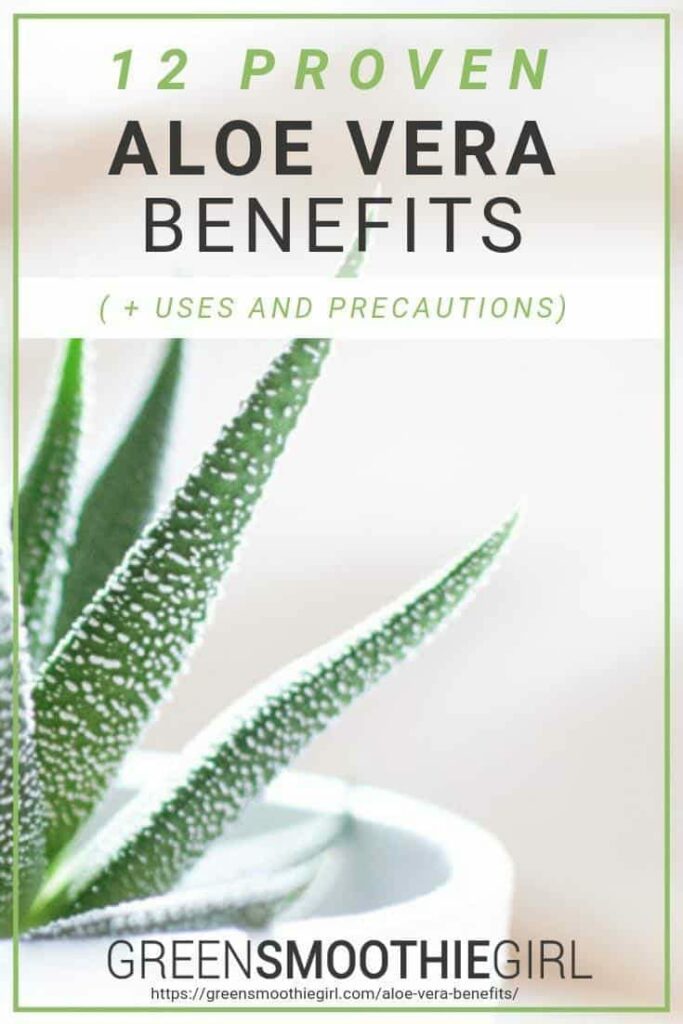













Do the giant aloe leaves at supermarkets the same thing? If so, can you chop it up and freeze it?
Yes, it’s the same plant family. Personally, I fillet the big leaves and rinse the inside ‘gel’ before using. I have sliced these into thin strips, refrigerated and then applied to sunburns, bruises, bugbites, etc as it’s has an osmotic pulling reaction to inflamed skin when used topically.
Look for the common medicinal aloe houseplant, widely available commercially, or on craigslistetc. It’s is the most useful plant to have around.
Yes Barb, the giant aloe leaves at the supermarket are the same thing as long as it’s a whole "intact" plant. Yes you can freeze it.
What type of Aloe plant is the best to use when adding to a smoothie?
Do not use the spotted aloe . Only use the plain leaved aloe vera plant.. Also cut the largest leaf, not the smallest ones.
Hi Judy, it’s the Aloe "Vera" plant.
Can you use the aloe that is in a bottle at grocery store section already prepared to drink for acid issues?
Yes. Just read on the bottle to be sure it has no water. Get the gel. It has been blended.
Green smoothly girl, You said chop off a spear an add it to your smoothly. The green part and all?
No. The outer part is a strong laxative.
Robyn does recommend using a small piece of the whole plant including the outer part if you want a laxative effect. You can start with small amounts as indicated in the blog and work your way up from there. If you have more of a plant based diet and you don’t need a laxative effect, you can just add the gel part to your smoothies.
Yes but only in small amounts because the outer leaf can act as a laxative.
What about the supposed carcinogenic effects of the leaf itself?
If I peel (fillet) my own homegrown aloe plant, do I want 1/2”-1” in my own smoothie (pint) or just that much in the whole 2.5 qt smoothie divided among my family?
In your own smoothie.
I was wondering: how long do you leave the aloe vera and coconut oil treatment on your scalp? Thank you!
Hi Stephanie, you can leave it on for 30 minutes but keeping it on for longer is fine too. Some people keep it on overnight.
Do you recommend any other aloe in smaller quantities to try it before I invest in the giant bottles